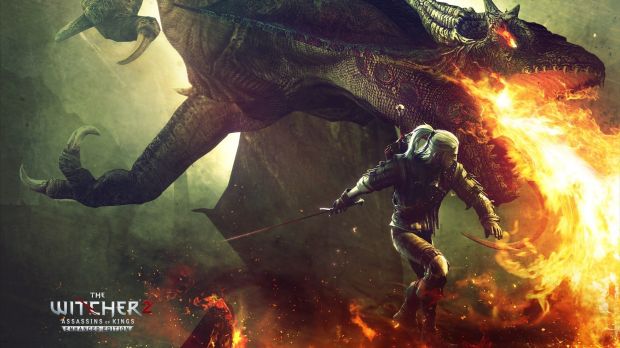-
Welcome to rpgcodex.net, a site dedicated to discussing computer based role-playing games in a free and open fashion. We're less strict than other forums, but please refer to the rules.
"This message is awaiting moderator approval": All new users must pass through our moderation queue before they will be able to post normally. Until your account has "passed" your posts will only be visible to yourself (and moderators) until they are approved. Give us a week to get around to approving / deleting / ignoring your mundane opinion on crap before hassling us about it. Once you have passed the moderation period (think of it as a test), you will be able to post normally, just like all the other retards.
You are using an out of date browser. It may not display this or other websites correctly.
You should upgrade or use an alternative browser.
You should upgrade or use an alternative browser.
The Witcher 2 Enhanced Edition
- Thread starter Azalin
- Start date
Sensuki
Arcane
The second, and far less known, mod I discovered, The Rise of the Sword, is my personal favorite mod for the game since it addresses the shitty animation issue by giving you complete confidence about which animation will play out (sort of like in the Souls games or any competent action rpg). For any future playthroughs, this mod is going to end up the first mod I install despite its negatives. This is what the mod does from my experience:
- It separates all of Geralt's attacks into 3 categories based on attack ranges: short, medium and long range attack animations. Within each range, the WASD direction buttons determine which of the 4 attacks Geralt will perform. If you've played Mount & Blade, you should sort of get the general idea. By holding down the Control or Shift keys, you change the attack range to medium or long.
- The game also allows you to manually aim your attacks with a targeting reticule. As a result, it's possible to precisely choose attacks that are aimed at an enemy soldier's right half of the body when he is carrying a shield on his left side.
- It takes a bit of getting used to since there are over 20 attacks that Geralt can do, and I had to clear 20 waves in the arena before I got the hang of the mod's combat system. The combat becomes entirely offense driven, and on the plus side, the necessity to roll around or spam quen is quite minuscule. Clearing entire waves in the arena without taking a hit or rolling around is actually quite fun and does justice to the in-game lore that states Geralt is one of the best swordsmen in the game.
- As a bonus, it allows you to hold down the medallion key to continuously send out pulses (rather than having to wait for the medallion to cool down), which helps a ton in looting.
The biggest issue with the mod is that once you are used to it and figure out the more potent attack animations, combat becomes trivial. You absolutely must play it on Dark difficulty to have any semblance of challenge, but even then, the AI is not designed around the player having complete control over which attack Geralt performs, and so the game becomes a cakewalk. The mod also makes all of Geralt's actions instantaneous, which allows you to spam attack enemies to death. Give the mod a try in the arena to see if you like the combat changes.
That actually sounds really good - like exactly how I would prefer it to be.
otsego
Cipher
- Joined
- Aug 22, 2012
- Messages
- 232
Just started Witcher 2 up again and damn, Geralt cannot handle any DMG what so ever in the second game. What the hell. Rise of the Sword, gonna try that one for sure.
Enjoyed this because it encouraged smart play. Unfortunately a lot of 'smart play' involved rolling everywhere and being clairvoyant with regards to what you were facing.
DraQ
Arcane
Enjoyed this because it encouraged smart play. Unfortunately a lot of 'smart play' involved rolling everywhere andbeing clairvoyant with regards to what you were facingspamming Quen.
 , also fixed.
, also fixed.Ezrite
Learned
- Joined
- Nov 20, 2014
- Messages
- 205
Enjoyed this because it encouraged smart play. Unfortunately a lot of 'smart play' involved rolling everywhere and being clairvoyant with regards to what you were facing.
Well this is my issue with most third person hack n slash game like God of War or Devil May Cry. All one do is either run around in circles and spam an attack. I hear Dragon Age 3 is even worse. It is like a third person hack and slash RPG like Diablo. Not that the Witcher is a shitty hack n slash RPG series although.
The only game series I think do this okay is the Souls series. But well, might just be me who is shit at this kind of gameplay but im not really enjoying the combat. You can feel the swing and the impact as Geralt hits but its a bit fidgety and I miss the point and click system of the first at times since this is just annoying. Roll roll roll roll roll, swing sword! There is a opening! Roll roll roll roll roll.
DraQ
Arcane
I liked 2's combat more as at least it was (semi) responsive - no need to wait out lengthy awsum attack choreography, but it was hardly perfect.Well this is my issue with most third person hack n slash game like God of War or Devil May Cry. All one do is either run around in circles and spam an attack. I hear Dragon Age 3 is even worse. It is like a third person hack and slash RPG like Diablo. Not that the Witcher is a shitty hack n slash RPG series although.
The only game series I think do this okay is the Souls series. But well, might just be me who is shit at this kind of gameplay but im not really enjoying the combat. You can feel the swing and the impact as Geralt hits but its a bit fidgety and I miss the point and click system of the first at times since this is just annoying. Roll roll roll roll roll, swing sword! There is a opening! Roll roll roll roll roll.
Rolling was free and therefore the perfect response to any threat, scenery physics was clunky, so you could get caught on shit you shouldn't get caught on leading to some cheap deaths, Quen was a must-have at all times and blocking was useless because it cost vigor and wasn't nearly as versatile as rolling away.
If blocking was free and rolling cost vigor or at least was more situational and/or impractical as immediate threat response the combat would have worked much better.
Of course, preparation was far superior in 1 (alchemy), Quen was also situational rather than standard issue deflector shield.
DraQ
Arcane
One thing is durations - in 2 potions can wear off during pre-combat cutscene, the other is being able to quaff an elixir at any time - 1 had really good quaffing mechanics allowing you to drink potion at any time but having actual animation for that and leaving you defenseless, so you had to ensure your momentary safety somehow.True that, I didn't need to meditate to have a swallow up for a few minutes only.
Great Deceiver
Arcane
- Joined
- Aug 10, 2012
- Messages
- 5,894
I'm replaying TW2 with the FCR mod and you can quaff elixirs out of meditation. It's a good change. Not sure how I feel about the rest of the combat though, at least you don't spam roll like a retard anymore and enemies don't get backstabbed. On the other hand, the spinning animation looks silly and it's sometimes tough to tell what's going on since there's autoblock. It does fix the Quen abuse though, which for me was the biggest problem with the base game.One thing is durations - in 2 potions can wear off during pre-combat cutscene, the other is being able to quaff an elixir at any time - 1 had really good quaffing mechanics allowing you to drink potion at any time but having actual animation for that and leaving you defenseless, so you had to ensure your momentary safety somehow.
CthuluIsSpy
Arcane
What's annoying is that you practically get no potion buffs during the Draug quest, since the potion timer still tics down when you are jumping between bodies, and there are no safe places to mediate. Bit of a disadvantage when going alchemy.
Lilura
RPG Codex Dragon Lady
- Joined
- Feb 13, 2013
- Messages
- 5,274
The only game series I think do this okay is the Souls series.
Blade of Darkness also has decent 3rd person combat, but clumsy role-players with no hand-eye will find it brutal.
This comment isn't directed at you:
Not being able to quaff potions in combat was one the most ludicrous changes from TW1, it just makes the sequel meta-gamey/reloady... nothing can fix TW2's atrociously clunky combat, though.
DraQ
Arcane
That's why the most obvious fix would be making durations similar to those in TW1 - if an elixir can last you entire night, there is no worry about ten minutes here or there.What's annoying is that you practically get no potion buffs during the Draug quest, since the potion timer still tics down when you are jumping between bodies, and there are no safe places to mediate. Bit of a disadvantage when going alchemy.
Would also make individual elixirs more impactful, allowing to make them more resource expensive and forcing player to manage their effects wisely.
Ezrite
Learned
- Joined
- Nov 20, 2014
- Messages
- 205
Blade of Darkness also has decent 3rd person combat, but clumsy role-players with no hand-eye will find it brutal.
This comment isn't directed at you:
Not being able to quaff potions in combat was one the most ludicrous changes from TW1, it just makes the sequel meta-gamey/reloady... nothing can fix TW2's atrociously clunky combat, though.
I simply love battles in Dota 2 for example but these clunk RPGs, I am not a big fan of them. I think this Blade of Darkness is to much for me, if you its not for clumsy role-players!
Lilura
RPG Codex Dragon Lady
- Joined
- Feb 13, 2013
- Messages
- 5,274
Blade of Darkness is too much for most people... but I had in mind your average Morrowind "gamer", someone who is used to absent-mindedly spamming attacks and never dodging... Even though BoD is harder to get into than Dark Souls, if you can play the latter you can prob handle it.
Old Hans
Arcane
- Joined
- Oct 10, 2011
- Messages
- 1,473
Dark Souls does it right. People say they hate games being compared to Dark Souls so much. Then maybe modern action games shouldn't suck so much.
yea demon's and dark were such good systems. Dragon's Dogma was another excellent addition. Less tactical than Souls and hampered by the Skyrim system of "pause game, eat 200 apples to heal" but it was super fun.
Witcher always comes off as "we're really inspired by game X combat, but we don't really know how to do it like that"
- Joined
- Nov 4, 2007
- Messages
- 14,785
- Joined
- Jan 28, 2011
- Messages
- 97,437















http://news.softpedia.com/news/Linu...e-Kernel-for-a-Witcher-2-Problem-471046.shtml
Linus Torvalds to Patch the Kernel for a Witcher 2 Problem
The kernel needed a fix and Linus provided a patch
Linus Torvalds is not known to interfere with other projects than the Linux kernel and it must be something really special to get him involved. Well, it looks like the Linux port of The Witcher 2: Assassins of Kings proved to be interesting enough.
There has been quite a debate around The Witcher 2: Assassins of Kings and the fact that it wasn't really a port. A special kind of wrapper was used to make the Windows version of the game run on Linux systems, similar with Wine. As you can imagine, the performance on Linux systems took a hit and users felt betrayed because they thought that they would get a native port.
The game was a mess right after launch and it has problems running on many systems. It didn't even work on AMD video cards. A few patches were released since then and some improvements were made. Even the AMD guys pitched in and made some fixes in their drivers. From the looks of it, the Linux kernel was also responsible for some of the problems and that's something quite important for Linus Torvalds.
Do not break user space
This is one of the mantras of Linux kernel development and it's been repeated ad nauseam by Linus Torvalds. Basically, it means that developers should not have to work around stuff that can be fixed in the kernel and that kernel developers should not make changes that would force app developers to adjust their work.
This is the reason why Linus Torvalds left a message on GitHub, on one of the topics for Witcher 2 in which he explained that a problem which needed to be solved by the game developers was actually in the kernel, and that he would write a patch for it.
"It looks like LDT_empty is buggy on 64-bit kernels. I suspect that the behavior was inconsistent before the tightening change and that it's now broken as a result. I'll write a patch. Serves me right for not digging all the way down the mess of macros," wrote Linus on GitHub.
The conversation is rather technical, but you can try to read it nonetheless.
- Joined
- Jan 28, 2011
- Messages
- 97,437















Cobbet on Witcher 2:
Return To The Witcher 2: Part 1 – The Good Bits
By Richard Cobbett on February 6th, 2015 at 7:00 pm.
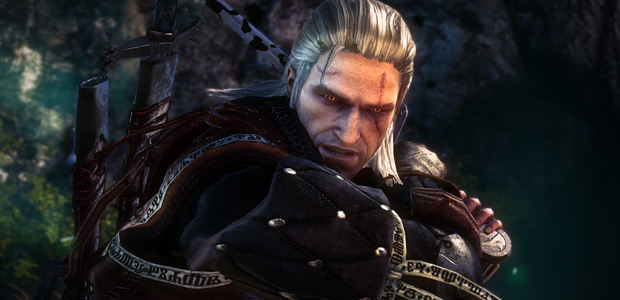
Now, if you’re anything like me, you’re really looking forward to The Witcher 3: Wild Hunt [official site] later this year, and you need to go to the gym a lot more. In anticipation of the first and avoidance of the second, I’ve been replaying the second game to refresh my memory and see a few things that I missed the first time round. With the benefit of hindsight, and a big update, where did it go right and where did it go wrong? Let’s do the negatives tomorrow and start with the positives today, of which it has so many to choose from…
1) It had high ambitions
What stands out about The Witcher 2 is that everything about it feels like an attempt to do one thing: to be the best RPG in the world, whatever it takes. You don’t get two completely different Chapter 2s – that only hardcore fans are going to go back to see the other side of – in a game where anyone is simply going through the motions. You don’t get production values like this in a game willing to make compromises. I’m not going to rave about the graphics and sound too much individually, because there seems little point. This game would look great released right now. I do however want to just take one moment for the details that are so easily overlooked but which add so much to the experience, like the realistic way that villagers run for cover when it rains and the first village being redressed with lights for a party after a successful operation (or set on fire, elsewhere).
There have been many, many great RPGs over the years. Very few have felt as immediately special, or as deeply loved by their creators. It’s a warm aura that flares early and never really fades.
2) It improved everything about the first game
While the number 2 in the name does rather give it away, it’s hard… in the best possible way… to look at The Witcher and its sequel and imagine them being from the same company, never mind the same series. The original was distinctly ropey in just about every way, from its writing to quest design to its production values, particularly before the Enhanced Edition came along to salvage the slashed up script. Even with its problems, it was a game that marked CD Projekt Red as a company to watch, but Witcher 2 instantly made it a top tier RPG developer. It was a confident game in a way that few others without major backing can dare to be, from its high system requirements that harkened back to Origin in being based around what the game needed rather than what the majority of the players were going to have, to a powerful start that set both the mood and expectations with a very tight series of vignettes ranging from dragon attacks to non-glorified torture.
On top of that, it’s hard to think of a sequel that seemed so willing to learn lessons instead of doubling down. No longer demanding things like buying books before hunting monsters. Making alchemy a higher-skill level thing to worry about so that the game wouldn’t constantly stop to search for flowers. Nowhere near as much backtracking. Far more attention given to the characters and the flow of the story. An opening chapter that kicked everything off with a bang, rather than the original game’s two or three chapters of pure tedium before the actual game starts.
Looking at the early materials for the third game, Wild Hunt, it seems unlikely that we won’t see an equally impressive jump with its move to open world design (hopefully a little deeper than Bioware’s implementation in Dragon Age Inquisition). Even now, another game using The Witcher 2’s engine, approach, and its graphical fidelity would be more than enough to be a AAA game. The fact that CD Projekt Red has actively avoided churning something out to prove that fact is a great sign. The changes made in the Enhanced Edition also show a willingness to learn from mistakes.
3) It gave you choices which felt important
Rarely are your decisions in The Witcher 2 even close to black-and-white ‘do you want the evil ending or not’ affairs – instead, Geralt is stuck between forces as conflicted as any you’d find in real politics and rarely if ever knowing the whole story. That has its issues (see next time), but it also puts you in a really interesting position as a character – knowingly working from limited knowledge, and not from a position of authority or particular strength. Geralt is a fine soldier for any faction to have, but that’s all, really. It’s through accident more than fate that he ends up in the right place at the right/wrong time to swing things in various directions.
The same applies to much of the plot, with the big sweeping second act variant getting the headlines, but so many characters recurring and little decisions paying off in small ways throughout the game. Aryan for instance, from the tutorial, able to reappear later during a dungeon escape. In practice, there aren’t actually that many big choices to make, but the ones that there are and the effects that they have make every small interaction potentially meaningful. That’s important, especially in a world that feels far more fragile than the average RPG setting.
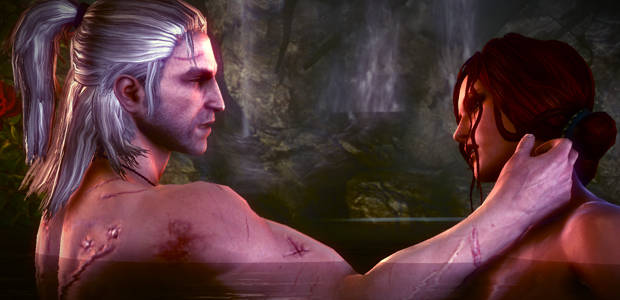
4) It handled it’s mature content maturely – mostly
Okay, we’ll be back to this next time because there are absolutely a few points where Witcher 2 drops the ball hard enough to bounce it into space. After the unfortunate nonsense of the collectible cards in the first game however, it was a pleasant surprise to see The Witcher 2 take a step back and rethink and and try to improve how it handled that content.
Two particular scenes spring to mind – the first being the sex scene between Triss and Geralt in the Elven Ruins. It works not because of how much it does or doesn’t show, but because it’s true to the characters – her magical striptease, his awkwardness, a little joking around as she pulls him in with her, and an appropriate cutaway. Great. That works. It’s a scene that gets to have its fan-service while still feeling like an encounter shared by two people and built on something more than “yay, we get to show some boobies now.”
The second such encounter is later on, with Ves, one of the Blue Stripes. Here it’s not the sex scene itself that works, which is fairly generic, but the lead-up to it. Geralt is challenged with fighting in an arena, with Ves as his final opponent after a series of victories. It’s made clear that she’s desperate to win the fight to prove herself to the others, and so a generous minded player might consider throwing the battle. Instead of course the correct path is to win, and in doing so actually show her the respect that she’s trying to earn. (Technically, I suppose you could lose fairly, but by that point in the game Geralt is functionally invincible unless you go get a coffee mid-fight…) It’s a well-executed scene that again plays well to the characters involved and their personalities.
5) Its combat was personal
A little like the original game, it’s not the raw visceral nature of the combat that stands out (honestly, that’s often The Witcher at its weakest), but the flow of it once proper abilities have been unlocked. Geralt’s fighting style hits an excellent balance between actually fighting, and controlling someone trained down to the bones to do this for a living. Silly as the constant rolling around early on can look, it quickly becomes very satisfying just having a box of tricks at every turn, and to be able to execute often ballet-style displays of brutality against crowds of bigger, stronger enemies.
On the easiest difficulty levels, yes, you can bash through things without even thinking about it. Played on the tougher ones though, it’s very satisfying to be playing not as a glorified fighter or rogue that any other game might have, but a Witcher with very specific ways of handling problems. Even if you go all out for magic, you’re still a Witcher who uses magic rather than an outright mage, while an alchemy heavy Witcher still relies on his sword of steel and sword of silver. Having such a specific character, and one likely to knock all players at least a little out of their comfort zone, really helps the mood, as well as establishing in game and lore what you can do. In particular, this works well for the first and final encounters that you have with the villain, Letho, where he’s likely to trounce you with his Witcher-specific skill-set in the first and then you’re able to return the favour with interest at the end. The latter is a particularly fun fight because it doesn’t give you any specific big advantage. It simply demonstrates how much you’ve come since your first match, up to and including being able to just walk away.
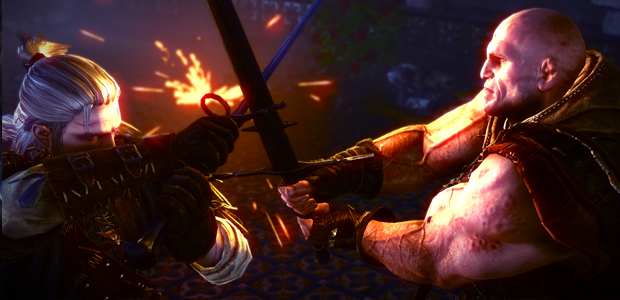
6) It showed respect for players
Now, this one has a sting in its tail, so we’ll be back to it next time. As a general rule though, The Witcher 2 has a rare and blessed confidence in its players to do everything from learn how to fight to picking up on the details of a story that they can’t even see a full half of during a single playthrough. Along with that, it goes out of its way to serve up good, complex quests rather than falling back on too much cheap collection stuff, to be willing to throw in tough fights from the very start, and to present its world without too much commentary. You don’t need to be told for instance that Roche and Iorveth the terrorist elf guy aren’t likely to paint the other in a good light. Nor is it ever really stated clearly (that I’ve seen, so it might be somewhere) that by mid-game nobody particularly gives a damn about whether Geralt actually killed a king or not. After all, they’re far too busy trying to take advantage of the situation. That convenient regicide? Pffft. So last week.
That willingness to dive into the political side of things, and to have the hero stuck on the sidelines without so much as a prophecy to boost their importance is just one of many reasons The Witcher 2 feels so different. It’s grimy, it’s cynical, and you know that whoever you help, they’re probably going to be a complete dick. Within Geralt’s head though, it still works because he has his own motivations, and picking the best of a bad lot is far more interesting than good/evil.
7) It had a sense of humour
And despite it all, it has a sense of fun and life too; in the dialogues, in the cut-scenes, in random interludes like Geralt’s unfortunate tattoo. Or CD Projekt’s generously patched in response to Assassin’s Creed 2’s ridiculous feather-hunting fetch-quest…
What The Witcher 2 really nails is that the people you meet live and have history in this world, and what happens will have serious effects in their future. The common people will get hurt, the kings and sorceresses will play their games, the fall of nations has effects for both the world and specific people caught up in it. This isn’t simply Geralt’s playground in a way that, say, Skyrim is for the Dovahkiin, but a world that feels like it lives and breathes and where life goes on where you aren’t. Just about every RPG tries to convey that feel, but very few actually succeed. With its political focus and close-knit group of recurring characters, The Witcher 2 managed it… even if it’s not always clear exactly what’s happened and what the larger implications of it are. (This, like many problems in the original release, was massively improved in the Enhanced Edition.)
And So Much More Good Stuff
I could go on, but we’re already at around 2000 words here. The Witcher 2 is easily one of the best RPGs of the last few years, both in its own right, and as something to be built on. I can’t wait for Wild Hunt to land, even if it does look like I’m going to need a RAM upgrade first.
But! Was The Witcher 2 perfect? No, of course not. Tomorrow, the things it got wrong, and more importantly, the things to hope that Wild Hunt has taken onboard and managed to fix…
- Joined
- Jan 28, 2011
- Messages
- 97,437















Oh, part two gonna be good when they start with their tirade.
Return To The Witcher 2: Part 2 – The Not So Good Bits
By Richard Cobbett on February 9th, 2015 at 7:00 pm.
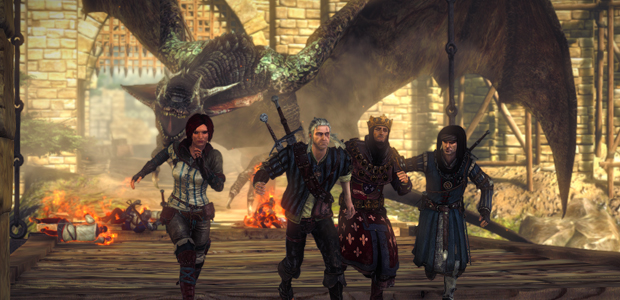
So, last time we looked at The Witcher 2 in all its glory. Today, we’re flipping it round. Where did things go wrong? Before we start, a clarification. While this will inherently be negative, it’s not to bash the game. The game was awesome, and many of the balls it dropped to the ground were at least pretty well gathered up by the Enhanced Edition. This is really more looking at issues to hope won’t be repeated by The Witcher 3: Wild Hunt [official site], allowing it to be all we want it to be.
1) Development Insularity
If The Witcher 2 had one fatal flaw, it was that it very obviously didn’t get enough fresh eyes on it during the later stages of development. My first hint of this was at a preview event, where the producer was running around telling everyone to use the medallion to find secrets, but when asked what the hint was that there was something to find, falling back on (paraphrase) “Because I just told you.” Sitting down in front of the full game, it quickly became obvious that too much of it had been built like that. Incorrect map locations for instance, which could only be missed if everyone was running to where they knew the thing actually was. Not taking any time to explain the magical Signs properly before dumping the player into an extremely tough fight. Poor conveyance of mechanics during the boss fights, most notably the appalling Kayran encounter early on. Assuming knowledge of the world geography and kingdoms, or where it was present, burying it in a boring codex. Codexes are for players looking to dig into lore, not for devs to avoid presenting it properly.
This also badly affected much of the story, which simply assumed that everyone playing would have at least a decent understanding of the world and characters and mechanics. This was also the case in the original Witcher, but that game was far more aimed at existing fans than the sequel, which shot for a far bigger audience. To Witcher fans, I’m aware that complaining of things like, say, not knowing the strategic importance of the Pontar valley or the nature of dragons and magic in this world is as petty as sitting down in front of a Star Wars game and going “What’s this Force thing everyone keeps talking about? Darth WHO?” Going in cold though, just basic things like whether or not the struggle over the Pontar Valley is actually important is easily missed, to say nothing of all the factions whose schemes were often either lost or seemingly dropped depending on the paths chosen in the game.
The Enhanced Edition went a long way to fixing these issues of course, and hurrah for that. Its proper tutorial offered a far better introduction to the game, and additional content sprinkled throughout the rest. Still, with Wild Hunt introducing more characters, including Ciri as a playable one, hopefully it will find ways to subtly clue in players who only know the world from the games, without slowing things down too much for those who already know the details from the books.
(My favourite moment of insularity remains when I previewed the game, and was told that I could talk about anything in it, except what happens to King Foltest. Yes, in a game called The Witcher 2: Assassins of Kings. They genuinely couldn’t see it wasn’t going to be a big surprise.)
2) Late Modding Tools
A minor one, but a disappointment. A couple of years was just too long to wait for the modding tools. If Wild Hunt is going to bother trying to push the mod potential, it has to be far quicker off the mark.
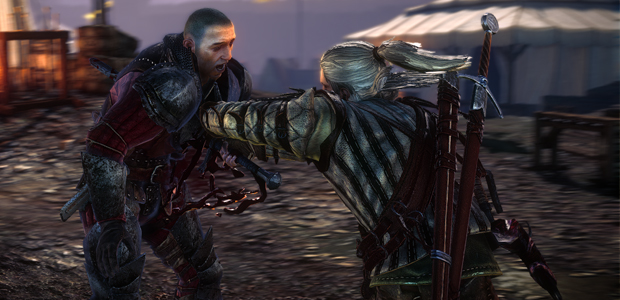
3) Combat Balance
The first few levels of Witcher 2 are just ghastly, mostly because you’re not so much making Geralt a better fighter as slowly making him a not-shit one. That’s an important distinction, especially when it comes to basics like not being able to even parry properly, and the ludicrous rolling-circus that every battle inherently becomes. By the end of the first Act though, the pendulum has swung almost the other way. For most of Act 2 and 3, you’re almost unkillable on regular difficulty levels unless you do something particularly stupid. Wild Hunt badly needs to find a better balance here where Geralt is good, but the threat of more than a couple of guys or taking on a large monster isn’t simply a case of struggling, picking the correct sword, and doing his world-famous impression of a blender.
4) A Lack Of Monsters
Yes, yes, there are monsters, but for the most part The Witcher 2 isn’t all that interested in that side of Geralt’s job, save as an explanation for why he’s good at killing the kind that wear human skin. That’s somewhat interesting in its own right as a plot element, but a game called The Witcher could have done with just a little more, well, Witching. Ideally of the kind beyond just killing some things in the forest with a couple of sword-swings. The monsters of the books tend to be much more interesting than that, not least in requiring lots of preparation and knowledge that demands a specialist’s attention rather than just a passing warrior. Wild Hunt’s open world will hopefully allow Geralt to get back to that kind of stuff, as well as ideally bringing in more of the Slavic and other more interesting mythological creatures that could do with getting more of an airing in fantasy worlds.
That said…
5) Boss Fights
Most were pretty bloody awful, either because the mechanics sucked (Kayran) or the timing wasn’t right (Letho, Round 1) Letho really could have done with being a bonus boss of sorts, with a reward for beating him but no expectation of doing so at that point. His final optional fight is far more enjoyable, both because it’s your choice and because it feels like a fair battle between equals. The escalation would have worked far better if the original had been a likely curb-stomp battle for comparison instead of something you still had to win.
6) Overly Fractured Story
One of The Witcher 2’s biggest features was its two different Act 2s depending on who you decided to trust at the start of the game. This is definitely very cool, and impressively ambitious. Looking back however, I think it was also a pretty serious mistake. Choosing means that far too many plot points are either not introduced properly or resolved poorly/off-screen. The sorceress conspiracy, the hunt for Triss, the whole business with the royal children… it’s there, but only in theory.
This reaches critical mass in the final act, which is just awful. To someone with it mapped out on a big whiteboard, there’s both a ton of content and lots of resolutions to everything. In practice, only seeing a tiny slice of it isn’t very satisfying at all, and the idea of replaying the entire thing… well, that’s a big time commitment, and one most people are only going to bother with if they were incredibly satisfied. I’d be curious to know whether or not you actually bothered, and which side you joined if you did. Certainly when I reached the end only to find nothing I’d been chasing resolved, and the big political upheaval being that a country I’d never heard of was going to take over a country neither I nor Geralt seemed to have any particular ties to, that wasn’t my first inclination.
I do still like the idea of seeing the story from both sides of the war, but it rests on actually seeing the story. At least, in enough detail to appreciate the bigger sweeps of what’s happening by the end, if not necessarily everyone’s reasons and rationales. (To use Dragon Age as an example here, one of my favourite things about the original game is that you get to talk to Loghain about his many acts of dickery and realise that for all he ballsed up, his motives were relatively sound.)
7) Pacing
Somewhat tied to the previous issue, yes, but the pacing of the game was a real mess. I remember reviewing it over a weekend or so, being near the end of Act 2 and e-mailing my editor to warn them that there was no way I was going to have finished it by Monday. I figured I was about halfway through, at the point where the story really kicks into gear. About ten minutes later, I looked in the game diary to be told that I was on the final leg. An hour later, the credits were rolling and I was feeling very, very let down.
A lot of this is tied to the first village, Flotsam, which contributes very little to the story, then the bulk of Act 2 as mentioned being fractured and throwing in plot elements all the time before only a few of them are actually picked up on for the end. I kept expecting a chapter where, for instance, I’d be dealing with the Sorceresses again, and finally rescuing Triss, not knowing that all that was going on in a different game entirely. I was waiting for a bit where I’d find out about the villain’s scheme, not realising that it would be a conversation largely tacked on the end where he just says “So, what do you want to know?” and infodumps harder than Tolkein after five laxatives. The end, where a few characters appeared to say a couple of lines, was a cliffhanger without the decency to bring a cliff.
The Enhanced Edition at least added some Fallout style final boards to the game to add proper context about what happened next around the world, and that helps a lot. The political situation is bigger than Geralt, but it was silly to spend that much time making you key to what happened and then not bothering to properly explain what that actually was. Wild Hunt will need to learn from this, and provide a storming finale in its own right, not least because it’s being sold as Geralt’s final adventure. I already know that I’ll want to know what happened to the people I met and helped, especially in a world where doing the right thing isn’t always what’s best.
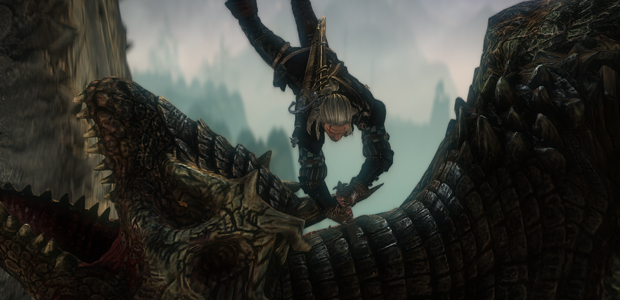
8) Mature Content Redux
Okay. Last time I praised half of the game’s handling of this, and now it’s time for the flip-side. To be clear, I don’t really care about the prostitutes and other casual encounters in the game, which are both fine in-context and not particularly interesting. Some of the major scenes though, I found a bit off-putting – the gratuitous Triss flashing in the intro, with Geralt’s body even making windows to admire her ass through, and a few specific things like the handling of Dethmold in his final scenes, which felt like it had come from another, far inferior game, and Phillipa’s scenes with Cynthia thrown in for no particular reason save audience titilation. In both instances it’s a case of execution rather than necessarily concept, especially after other things in the game showed that The Witcher 2 could have done them far better. Hopefully Wild Hunt will be as strong throughout.
9) Oh, Yes, And There Was A Character Called “Dethmold”
Fucking no.
For all this complaining, I reiterate that The Witcher 2 got far, far, far more right than it got wrong, and working through the list it’s gratifying to see how much is at least addressed if not entirely fixed by the Enhanced Edition. Certain things of course are baked in, like the nature of the plot, but even then it saw additions like more content for the otherwise pretty empty third act. It would have been very easy for CD Projekt to simply sniff at complaints that, for instance, the combat was too hard to get into. Instead, it took the time to implement a dedicated tutorial. Where information was lacking, it was added in as carefully as possible, and smoothly enough that it’s tough to notice that it wasn’t there in the first place. The result is a far more polished, and more importantly, far more self-aware game than the one that first hit shelves, with lessons being both learned and applied already. I can’t think of many better ways to suggest that Witcher 3 will be as big a jump for both the series and CD Projekt RED’s RPG craft that Witcher 2 was from the original. I for one can’t wait.
And hopefully this time, we won’t even need a second version to fix it all up…
- Joined
- Oct 26, 2012
- Messages
- 5,111
As expected, maturity and story comments are based entirely on "why isn't this game holding my hand throughout and catering to my world views?" I saw coming from RPS. Modding tools coming out late is sadly a legit point to raise, though.
Last edited:






![The Year of Incline [2014] Codex 2014](/forums/smiles/campaign_tags/campaign_incline2014.png)
